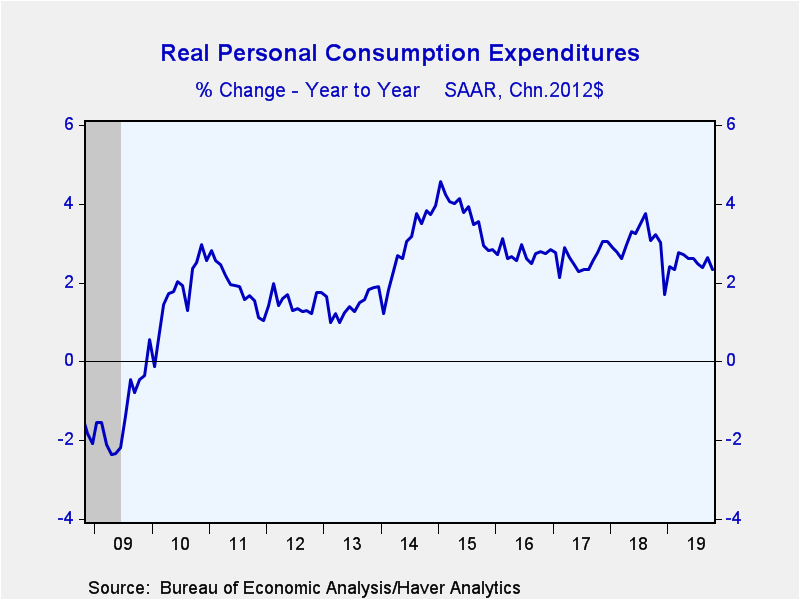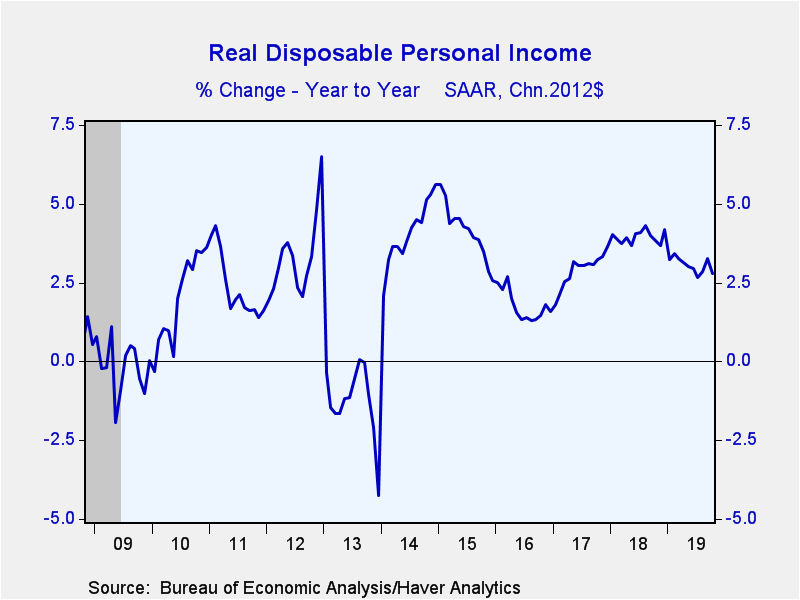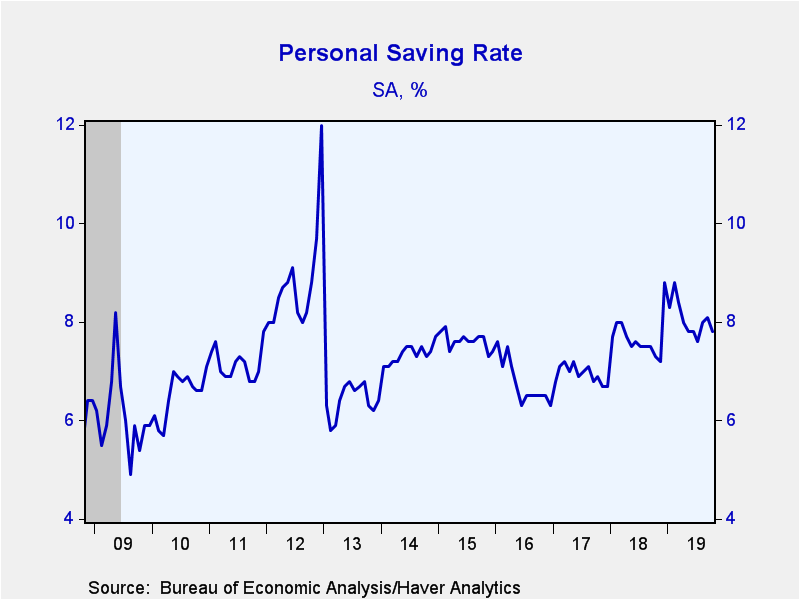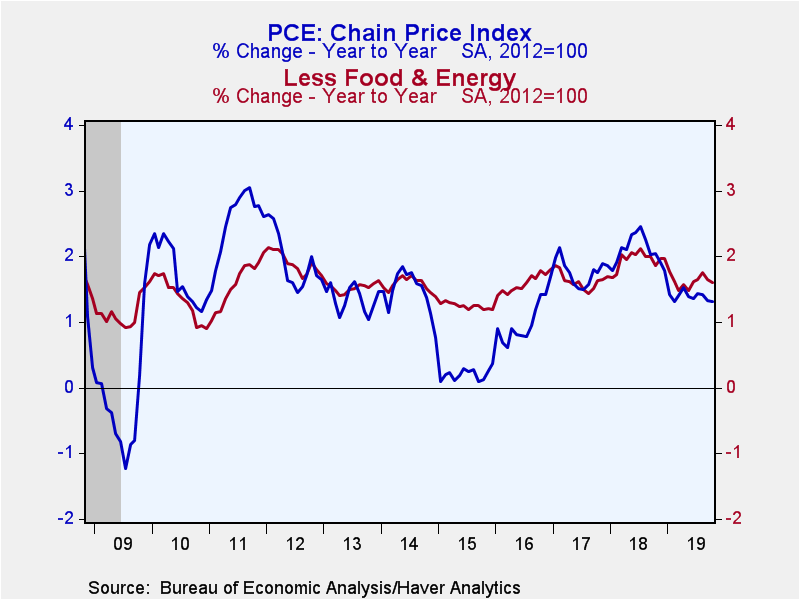 Global| Nov 27 2019
Global| Nov 27 2019U.S. Personal Spending Increases As Income Steadies
by:Tom Moeller
|in:Economy in Brief
Summary
Personal consumption expenditures rose 0.3% (3.7% y/y) during October after an unrevised 0.2% September rise. The increase matched expectations in the Action Economics Forecast Survey. In constant dollars, spending edged 0.1% higher [...]
Personal consumption expenditures rose 0.3% (3.7% y/y) during October after an unrevised 0.2% September rise. The increase matched expectations in the Action Economics Forecast Survey. In constant dollars, spending edged 0.1% higher (2.3% y/y) following two 0.2% monthly increases. Constant dollar spending on services provided the lift to consumption last month with a 0.2% rise (1.6% y/y). Real outlays on housing & utilities gained 0.3% (1.1% y/y) while real transportation services usage rose 0.2% (2.8% y/y) after declining 0.3%. Constant dollar spending on food services & hotels rose 0.2% (1.5% y/y) after a 0.3% rise. Real health care outlays also improved 0.2% (3.1% y/y) for the third straight month. Constant dollar recreation services expenditures declined 0.3% (+0.5% y/y), off for the third month in the last four. These gains were offset by a 0.8% decline (+5.2% y/y) in constant dollar spending on durable goods after a 1.1% jump. The declined reflected a 2.7% easing (+1.8% y/y) in real motor vehicle buying, the third decline in four months. Outlays on recreational vehicles strengthened 0.7% (11.6% y/y) after slipping 0.1% in September. Constant dollar demand for home furnishings & appliances rebounded 0.5% (3.8% y/y) after a 0.5% fall. Real nondurable goods outlays rose 0.2% (3.2% y/y) after a 0.1% slip. Clothing & footwear demand in constant dollars jumped 1.8% (3.1% y/y) after a 0.1% uptick. Real food & beverage purchases gained 0.2% (2.2% y/y) as did gasoline demand (1.5% y/y).
Personal income was unchanged (4.4% y/y) in October following a 0.3% rise. A 0.3% rise was expected. Wages & salaries improved 0.4% (4.9% y/y) after a 0.1% uptick. Proprietors income fell 1.0% (+5.0% y/y), the first decline in nine months. Rental incomes improved 0.6% (2.3% y/y) after three straight months of slight increase, but receipts on assets fell 1.0% (+0.6% y/y) due to a 1.7% decline (-1.0% y/y) in interest income, the third drop in four months. Transfer receipts improved 0.3% (7.2% y/y) after a 0.2% rise.
Personal disposable income eased 0.1% in October (+4.1% y/y) after rising 0.3% in September. Adjusted for inflation, take-home pay fell 0.3% (+2.8% y/y) and reversed September's increase.
Last month's strength in spending relative to the gain in income lowered the personal savings rate to 7.8% from 8.1%. The level of personal saving rose 10.1% y/y last month.
The PCE chain price index increased 0.2% (1.3% y/y) following two months of stability. The price index excluding food & energy edged 0.1% higher but the y/y increase fell to 1.6%. Energy prices increased 2.6% (-4.2% y/y) after two months of decline. Food prices improved 0.2% (1.1%) following September's stability.
The personal income and consumption figures are available in Haver's USECON database with detail in the USNA database. The Action Economics figures are in the AS1REPNA database
Tom Moeller
AuthorMore in Author Profile »Prior to joining Haver Analytics in 2000, Mr. Moeller worked as the Economist at Chancellor Capital Management from 1985 to 1999. There, he developed comprehensive economic forecasts and interpreted economic data for equity and fixed income portfolio managers. Also at Chancellor, Mr. Moeller worked as an equity analyst and was responsible for researching and rating companies in the economically sensitive automobile and housing industries for investment in Chancellor’s equity portfolio. Prior to joining Chancellor, Mr. Moeller was an Economist at Citibank from 1979 to 1984. He also analyzed pricing behavior in the metals industry for the Council on Wage and Price Stability in Washington, D.C. In 1999, Mr. Moeller received the award for most accurate forecast from the Forecasters' Club of New York. From 1990 to 1992 he was President of the New York Association for Business Economists. Mr. Moeller earned an M.B.A. in Finance from Fordham University, where he graduated in 1987. He holds a Bachelor of Arts in Economics from George Washington University.
More Economy in Brief
 Global| Feb 05 2026
Global| Feb 05 2026Charts of the Week: Balanced Policy, Resilient Data and AI Narratives
by:Andrew Cates










